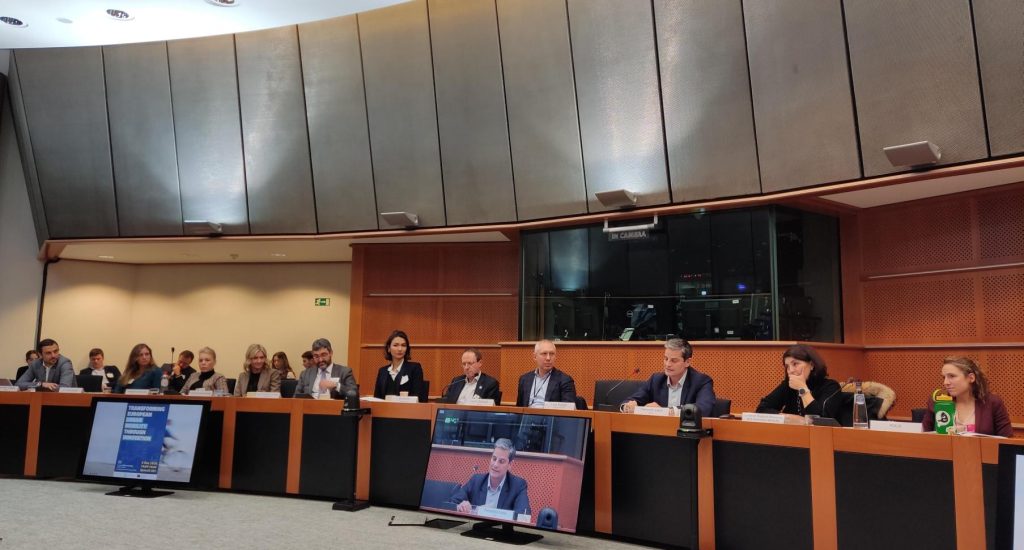Friday, December 6th, 2024
On 3 December 2024, the European Parliament hosted an event entitled “Transforming European Urban Mobility Through Innovation”, co-organised by EIT Urban Mobility and MEP Lena Schilling (Greens, Austria). Bringing together policy makers, industry leaders, academics, and innovators, the event explored the challenges and opportunities of achieving competitive and sustainable urban mobility across Europe and the need to deploy mobility and logistics innovation at scale. Discussions focused on policy frameworks, the role of innovation, and the integration of freight transport in sustainable urban strategies.
Some takeaways
Visionary leadership and policy framework
Lena Schilling, Member of the European Parliament, underlined the importance of promoting sustainable urban mobility in line with the EU’s smart and sustainable mobility strategy and climate neutrality goals. She emphasised the critical need for capacity building and skills development to drive this change, highlighting in particular the women-led projects supported by the EIT Urban Mobility.
Dr Maria Tsavachidis, CEO of EIT Urban Mobility, presented the recently launched Deploying Mobility Innovation Manifesto, which provides actionable policy recommendations to accelerate innovation in urban mobility.
Isabelle Vandoorne, Deputy Head of Unit, DG MOVE, European Commission, noted the inclusion of urban hubs in the revised TEN-T Regulation, which requires over 400 cities to develop Sustainable Urban Mobility Plans (SUMPs) by 2027. She also acknowledged the efforts of the Expert Group on Urban Mobility (EGUM). This expert group, of which ALICE is a member, provides guidance on the implementation of the Urban Mobility Framework.
Urban freight: a key pillar of sustainable mobility
ALICE Secretary General Fernando Liesa stressed the need to integrate urban logistics into sustainable mobility strategies. He highlighted ALICE’s commitment to freight transport and logistics climate-neutrality declared already in 2017 and referred to the Roadmap Towards Zero Emissions Logistics 2050 published in 2019. Fernando highlighted the long lasting collaboration with organisations such as POLIS, Eurocities, C-40, ERRIN and ERTICO-ITS, particular the development with POLIS of a joint guide for advancing together towards zero-emission urban logistics by 2030.
“Urban spaces are transforming rapidly to create more liveable, pollution-free cities” Liesa noted. “Freight transport is essential to ensure that goods reach schools, hospitals, businesses, and homes. We call on cities to include logistics as a key component of urban mobility planning.”

Bridging innovation and implementation
EU-funded projects under Horizon Europe, including URBANE, DISCO, DELPHI and GREEN TURN, have been cited for fostering multi-stakeholder collaboration. These projects address challenges such as redefining urban spaces, implementing low emission zones and advancing urban planning and the contribution of data spaces to the whole value chain. However, Liesa warned that these initiatives will not continue without sustained support for innovation in urban logistics. The aim of the projects is to support systemic transformation for the public good in complex ecosystems in which individual organizations can not innovate alone without strong collaboration.
He also stressed the importance of harmonising measures across cities to create economies of scale. ” Start-ups and SMEs often deal with local ecosystems, but harmonised frameworks would allow them to scale up their innovations across Europe.”
Fernando Liesa called to integrate the European Commission Expert Group on Urban Mobility (EGUM) recommendations into the Climate-Neutral and Smart Cities Mission and other Urban Mobility related programmes, ensuring urban mobility and logistics remain central to systemic transformation. “We need instruments that align innovation, financing, local impact, and pan-European scaling opportunities. Without these, the transition to zero-emission urban mobility could be jeopardised.”
The event emphasised the importance of collaboration between stakeholders to address the systemic transformation of urban mobility. Participants highlighted the need for continued support from Horizon Europe, EIT Urban Mobility and complementary initiatives.
ALICE invites cities, companies, and research institutions to collaborate on shaping the future of logistics innovation. Together, we can drive systemic transformation, align local impact with EU-wide goals, and build resilient urban mobility systems.
Learn more about our initiatives and membership opportunities here.
